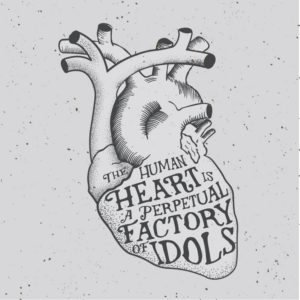
How do you view the idols in your heart? How do you feel about the wrong desires or over-desires that lurk deep within and encourage you away from faithful worship of the Lord? When we see ourselves becoming controlling, does that bother us? When we get irritable because someone has interrupted the comfort that we have decided we deserve, do we resolve to work on our own hearts rather than lash out at the person who’s crashed our time of peace? Are we unhappy with the grumbling and discontent in our hearts and eager to pursue contentment in Christ? Do we long to be different when we see in our lives a persistent desire to punish or cleanse ourselves when the Scriptures say that Christ has left made us clean?
Not comfortable questions, I’ll admit, but important ones. The answers tell us a great deal about whether we are willing to bring our wayward hearts to the Lord for change or not. They speak volumes about whether we’re serious about modelling Christ-centred transformation to others.
To put the questions another way, are we more like King Amon (2 Kings 21) or King Josiah (2 Kings 22-23)?
Amon and Josiah had something in common: when they came to the throne, they both inherited a temple stuffed full of idols. King Manasseh (their father / grandfather) was largely to blame for that – his pro-idolatry stance meant there was little room for faithfulness in Judah in his time. The temple, which was meant to be set apart as a place for the presence of the Lord, was crammed with statues and practices that were an affront to a holy God and that, in turn, meant the people’s behaviour had gone very astray.
As Christians, we too are set apart for holiness. We are the temple of the Holy Spirit. There aren’t meant to be idols in our hearts, but there are … in all of us, there are desires that distract our eyes from God and encourage us to pursue rival paths.
Amon went along with the idols he saw around him. Maybe he genuinely believed the idols would bring him prosperity – maybe he saw them as politically expedient – either way, he was drawn to them rather than repulsed. As the Bible says, “He did evil in the eyes of the LORD, as his father Manasseh had done. He followed completely the ways of his father, worshiping the idols his father had worshiped, and bowing down to them” (2 Kings 21:20-21).
At times, we can be the same – or similar, at least. Our over-desire for control can help us get what we want. Our over-desire for romance can feel like a legitimate drive that keeps us in step with the culture around. We don’t want to let them go, so we keep on pursuing our idols – living life as if they are more important than God.
Josiah had a rather different approach. A much younger king, he had to be taught God’s law. On hearing it, however, his eyes saw the temple idols for what they really were: an affront to God and a destructive path for his people. He knew he had to act. The orders were given, his team swung into action. The idols were removed, carried out of Jerusalem and burned. The people responsible for the false worship were evicted from their homes. There was a real urgency in his actions – he knew that idolatry could not be left to grow unchecked – and, as his plans progressed, what freedom he brought God’s people.
Let your mind wander for a moment: how much freedom and growth could we pursue if we were as serious about the idols in our hearts, too? Maybe some of us already are and praise God if you are being a Josiah today! Of course, we can’t just reach in and rip out the desires that are pulling us away from God but we can bring them to the cross in repentance and faith – confident that grace never ends. If we genuinely see that our idols of wealth, success, experience, power (to name but four) are out of place in our hearts, if we acknowledge they are dishonouring to the Lord and destructive to us and the people around us, we will be more active in wanting them gone – more eager to run to the Lord for restoration and change. Can we see how much better it is to want what God wants – in the way that he wants it – rather than run after the transient cravings of a wayward heart?
A sign of Christian maturity is an increasing discontent with the unfaithfulness within. It’s not an easy path but always worthwhile. So let me try that question again (for you – and for me): how do you view the idols in your heart today?